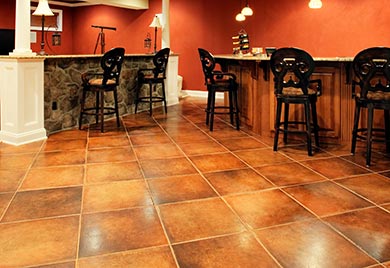
No one wants to live with a damaged tile floor. Not only are damaged tile floors unattractive, but they can also decrease the value of your home. If you notice , you will need to call a Grand Rapids tile flooring contractor as soon as possible. Below, you will find 7 reasons why your tile flooring is beginning to crack.
1. Something Heavy was Dropped
If the crack is isolated within a specific area (or even a specific tile), it’s likely the damage was caused when something heavy was dropped. Think back to the last time you could have dropped something heavy. Was it a piece of furniture you were moving in through the entryway, a plate or ceramic bowl? The iron in the bathroom? Did you accidentally drop a cast-iron pot while you were trying to wash it? All of these things may only show a small dent at first, but the damage can spread over time if the area sees continual pressure like constant foot traffic.
Also, keep in mind that certain rooms in your home may be more vulnerable to from a drop. For example, your can become cracked if heavy pots and pans drop onto your tile flooring and when you have people constantly moving in and out of the area. You may be looking to remodel your bathroom if a crack is forming and continues to spread from moisture.
2. Inferior Tile
If you have recently invested in , it’s normal to worry if the tile you bought is sub-standard. Thankfully, homeowners can depend on home improvement stores and other retail lines to comply with . This means that you can depend on your tiles to be made out of quality material. If you notice that a tile is not on par with ANSI and ASTM standards, we recommend avoiding that brand.
Inferior tile won’t hold up as well or as long as approved tiles. Their material durability may seem okay at first glance, but under constant use, it may chip and crack sooner. Be sure to check with your tile provider to learn about what the best option for your home may be.
3. Heavy Stationary Loads
As a knowledgeable tile flooring contractor, we often get asked if heavy appliances could cause tile to crack. Most residential tiles comply with standards. The test makes sure that your tile can support up to 250 pounds of pressure per square inch.
This is a lot of pressure when you consider the fact that a side-by-side refrigerator that takes up 22 cubic feet only exerts 75 pounds of pressure per square inch. While it’s possible for tile flooring to become cracked under heavy loads, it’s rare.
4. Installed Over a Control Joint

When the tiling is cracked, most homeowners assume that it has something to do with the tile itself. However, any flooring repair contractor would be able to tell you that the tile flooring you walk on is just one layer in a flooring sandwich.
Since the concrete underneath is vulnerable to cracking, control joints are used to make sure it cracks in a predictable straight line. For this reason, your contractor should never install tiles over an area they know will eventually crack.
5. Installed on Improperly Spaced Joists
The joists are the bottom-most layer in your flooring and are responsible for supporting everything above it. This includes the subfloor, underlayment, tiles, people, furniture and everything else. However, if your contractor spaces the joists too far apart, the tile flooring will have nothing underneath to support all that weight. As a result, the tiles will start to bend and eventually crack.
6. Cracks in Concrete Substrate
If you notice a crack that extends across multiple tiles, this is a sign that the concrete underneath has cracked. To prevent cracks from forming in the first place, we recommend you ask your contractor to install a crack isolation membrane during tile flooring installation.
7. Concrete Substrate Did Not Cure Long Enough
When you first pour concrete, you have to let it cure so all the water can evaporate. The concrete then shrinks once all the water has evaporated. The recommends that new concrete cure for at least 28 days or as long as possible. Freshly poured concrete that wasn’t given enough time to cure is more likely to crack and create .
Need New Tile?
When tile breaks, you’re probably going to want to get a specific square replaced or your entire floor. If you are interested in our tile flooring installation services, please feel free to give our Grand Rapids flooring contractors a call at (616) 458-4806. The flooring contractors at Complete Flooring & Interiors strive to help homeowners keep their homes looking beautiful through quality tile installation.
This blog has been updated to keep you provided with the best information!


